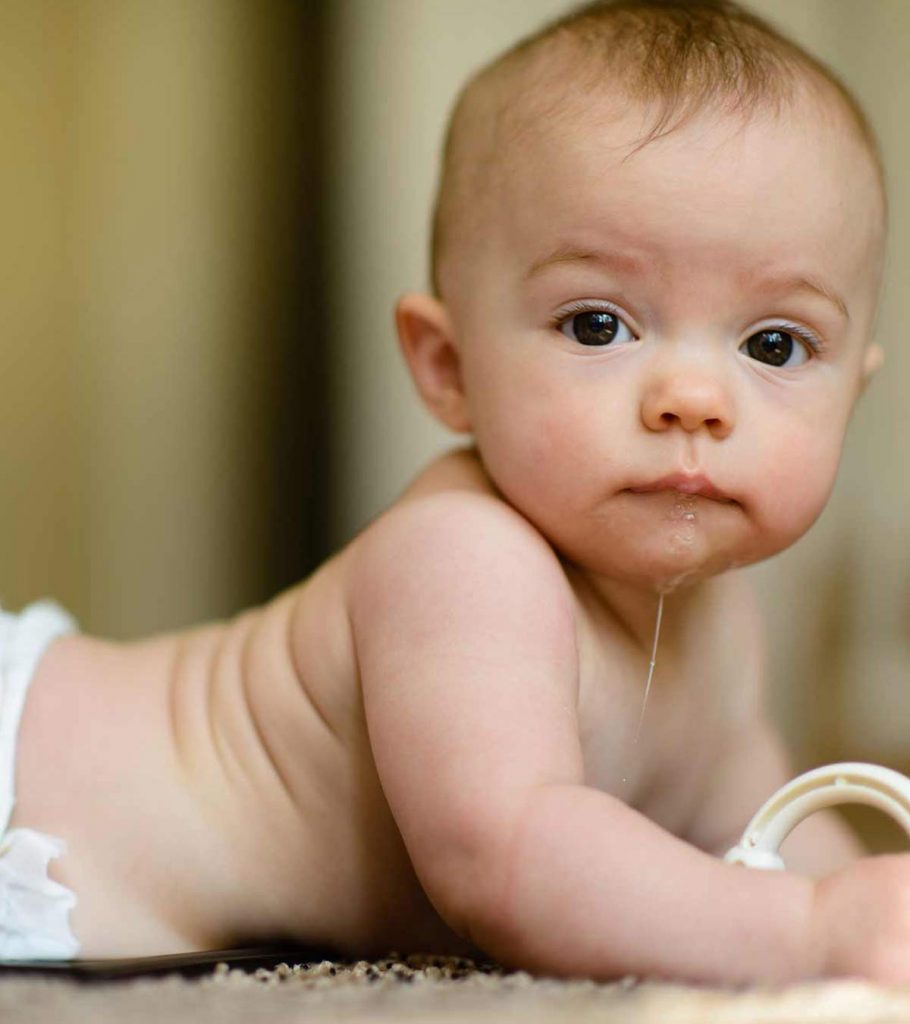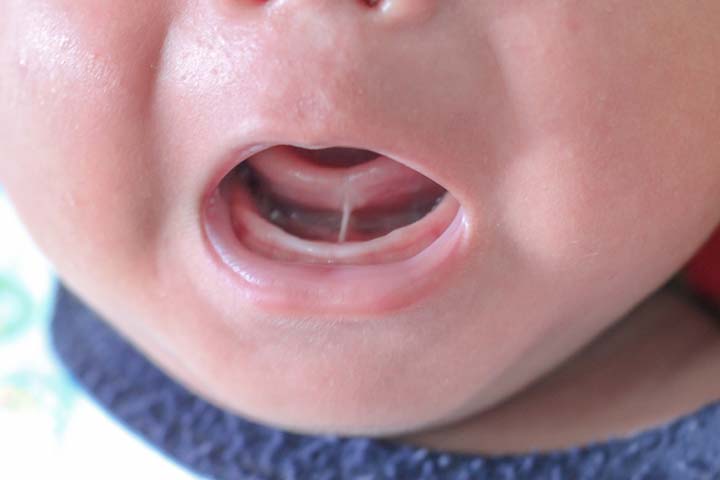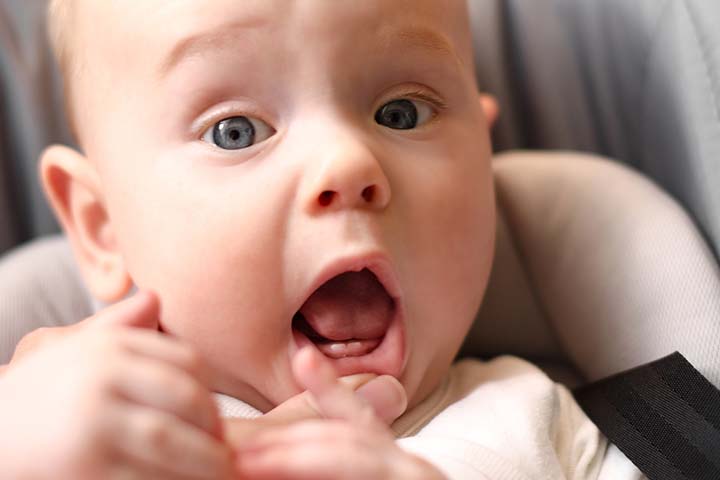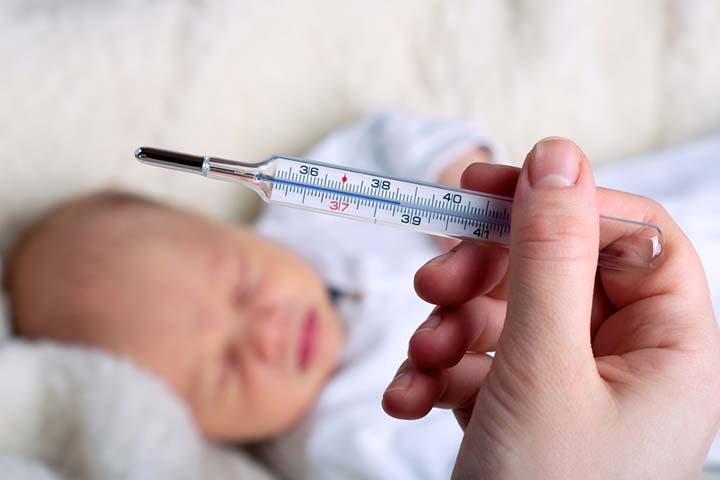Drooling in babies is usually noticeable once their salivary glands are active functionally, around two to three months (1). Since babies lack teeth and neck muscle control, the constant saliva produced in their mouths may not be withheld or swallowed by them. Therefore, the saliva accumulates to pass through their mouths finally. However, sometimes this usual phenomenon may surge, causing an increase in saliva production in the mouth, leading to a condition called hypersalivation or sialorrhea (2). Keep reading as we discuss the causes and management of drooling in infants. We also tell you about the ways to treat a baby’s excessive drooling in this post.
How Does Drooling Help Babies?
According to the American Academy of Pediatrics, drooling helps in the following ways (3):
- Keeps the baby’s mouth moist.
- Washes away food residue.
- Softens foods when the baby starts eating solids, thus making it easier to swallow.
- Protects the baby’s gums. Once the baby has teeth, the compounds in saliva prevent tooth decay.
- Saliva works as a natural antacid that helps prevent hyperacidity in the stomach.
- Saliva naturally contains compounds that convert starch into sugar.
There is no reason to worry about your infant’s development if they are drooling excessively but are otherwise healthy. However, you can curb it if you know what’s causing it.
What Causes Excessive Drooling In Babies?
The following conditions might lead to excessive drooling in infants and toddlers:
- Teething: Excessive drooling is usually the first sign of teething (4). Your baby can get their first teeth somewhere between five and seven months, when they may salivate more than usual (5).
Iris, a mother and a blogger, shares her experience with her daughter’s excessive drooling during teething. She reminisces, “When Juliet started teething at 4 months I was in a panic. She was cranky, drooling all over the place, and wasn’t sleeping … A local momma recommended this (amber teething necklace) to me and I noticed a significant decrease in drool with Juliet. I purchased mine at a local baby boutique. Make sure to purchase genuine Baltic amber. I was nervous about trying this out as I was afraid Juliet would pull on it but she didn’t even notice it (i).”
- Orofacial abnormalities: The anomalies in the facial bones, mouth, or lips can all lead to orofacial or oral motor developmental abnormalities. In most cases, these problems are congenital. Numerous orofacial conditions, such as cleft lipiXA congenital disability where the baby’s lip is abnormally developed and dysphagiaiXA condition marked by difficulty swallowing fluids, including saliva, usually caused due to an underlying medical reason, could cause excessive drooling in babies (6) (7).
- Upper respiratory illness: Infection of the upper respiratory system may cause a baby to drool more than usual. An example is an epiglottitis, an infection, and inflammation of the epiglottis, which is a flap of tissue right above the vocal cords. Doctors check for drooling to diagnose it, one of the significant symptoms of the condition (8).
- Neurological disorders: Drooling is often linked to disorders like autismiXComplex disorders leading to neurological and developmental delays and cerebral palsyiXA set of disorders affecting a person’s ability to move, balance, and maintain proper postures, and could be one of the earliest symptoms of the condition (9) (10). Autistic spectrum disorders are often linked with low muscle tone and developmental delay, both of which are said to contribute to excessive drooling.
- Mononucleosis: It is a viral infection in infants that can present with symptoms such as a sore throat, measles-like rash, swollen tonsils, painful and enlarged lymph nodes, and excessive saliva production, which may lead to drooling. Most babies recover with timely medical attention, antiviral medication, and proper home care, lessening drooling (11) (12).
- Jaw instability: A lack of oral muscular control and jaw instability is a classic symptom of certain neurological disorders. Apart from these, a potentially serious birth injury and hypotonia noticed in children with Down syndrome could also lead to jaw instability. Babies with such conditions may have difficulty swallowing and controlling their lower jaw and tongue movements. This limitation hinders the effective passage of saliva to the throat, causing excessive drooling (13) (14).
Whatever is the cause, if the baby is drooling unusually more, you may want to visit a doctor.
Should You See A Doctor If Your Baby Drools A Lot?
Not necessarily. If your baby is well in general, then there is no reason to worry about the excess drooling. The condition will go away on its own. But if the following conditions accompany drooling, then it is good to let the doctor look:
- Sudden excessive saliva or mouth-watering (drooling) could cause the baby to choke. Drooling can also be a sign of a foreign object stuck in the baby’s throat, causing the child to choke (3). If you suspect this, seek medical attention immediately.
- Fever of 100.4°F (38°C) or above.
- Excessive fussiness and coliciXPeriodic and predictable crying episodes in infants for an extended period with no definitive cause.
- Inability to eat and sleep properly.
- You notice redness inside the baby’s mouth and the throat.
- An older infant with teeth has trouble chewing or swallowing.
Does Excessive Drooling In Babies Require Treatment?
Usually, drooling or excessive salivation will not require treatment. If the baby displays other signs of a problem, then the doctor will diagnose the underlying condition causing the drooling and then proceed to treat it. Treatment could range from oral medication to reduce saliva production, to botox injectionsiXInjections administered into salivary glands that help control the production of excess saliva in the salivary gland (15). In cases of orofacial abnormalities, corrective surgery could also be recommended (6). Whatever the treatment, it will be recommended by a pediatrician post specific diagnosis.
Drooling can sometimes peak at night, causing a baby to wake up with a wet face, wet clothes, wet skin, or wet bedding. In such cases, it may be necessary to consult a doctor for evaluation. However, in most cases, simple home care measures could help deal with drooling in babies.
Sometimes, a little home care is all that is needed to deal with drooling in babies.
How To Manage Excessive Drooling At Home?
Managing all that excess saliva is easy with a few simple steps like the ones below:
- Put on the drool bib: You can buy a drool bib and let the baby wear it all the time to deal with the dribbling saliva. Bibs made from cotton work the best due to the material’s excellent absorbent capabilities. Keep changing the bibs and wash them every day with a baby-safe disinfectant detergent. Make sure to keep changing the wet bib from time to time.
- Keep tissues handy: If you are outdoors, carry a pack of tissues in your baby’s diaper bag. Wipe the excess drool from their wet mouth, chin and wet neck and throw the tissue in a dustbin right away.
- Give a teething toy: If your baby drools predominantly when he/she is teething, then give them a teething toy or a pacifier. It can help relieve the sore gums and bring down the excess salivation stimulated by irritated gums. Avoid teething necklaces since they increase the risk of strangulation and are not recommended by pediatric experts (16).
Treatment of the underlying condition will also work against excessive drooling. Eventually, the drooling should stop.
Your little one might start drooling at the very sight of delicious food! Although drooling is common and beneficial in babies, excessive drooling may indicate an underlying health concern, such as teething, infections, and neurological abnormalities. In most cases, your baby’s excessive drooling episodes will become less frequent with age. However, be observant of the signs and their overall health status to comprehend the possible reasons they may be drooling excessively. Further, talk to your pediatrician if you are concerned about excessive drooling in babies.
Key Pointers
- Babies are unable to withhold or swallow saliva due to lack of teeth and neck muscle control, causing them to drool.
- Drooling in babies helps keep their mouth moist, washes away food residue, softens food for easier swallowing, protects gums, and works as a natural antacid.
- Excessive drooling in babies can be caused by teething, orofacial abnormalities, upper respiratory illness, and neurological disorders.
- Medical attention is necessary if excessive drooling is accompanied by choking or fever.
- Excessive drooling in babies can be managed at home by using drool bibs, keeping tissues handy, and providing teething toys.
Worried about your baby’s drooling? Find out if it’s a sign of teething in this video.














